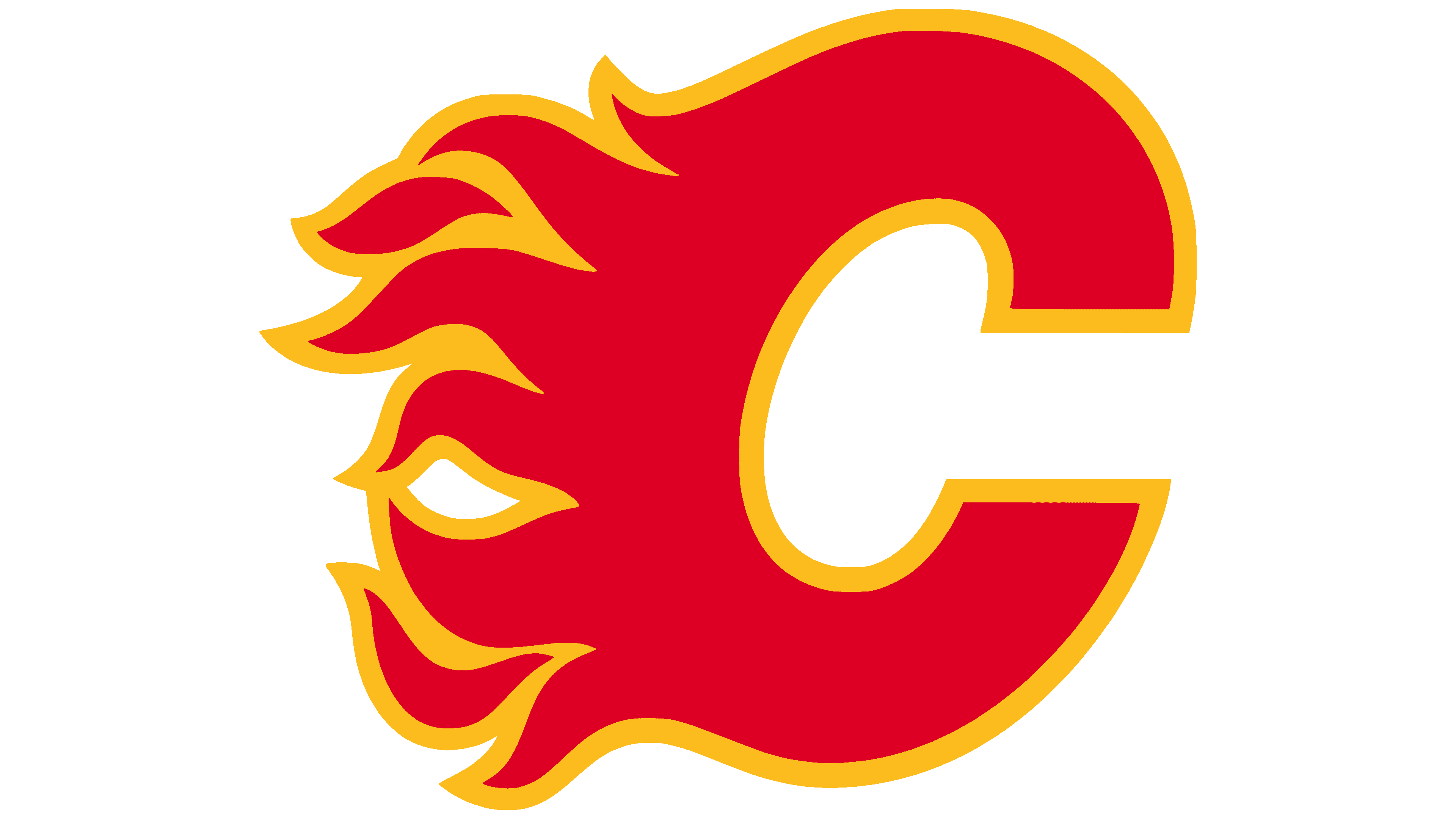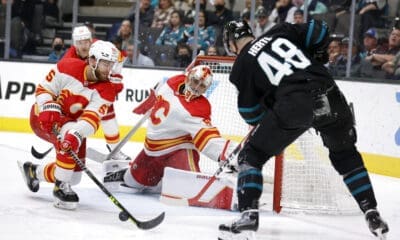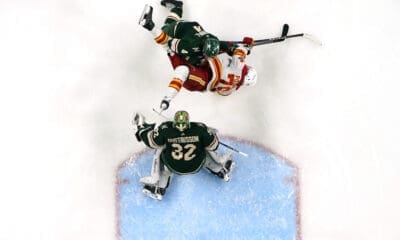Calgary Flames
NHL Realignment and the Anticipation of Painful Playoffs

Gary Bettman had the votes in the bag before the meeting started.
26 of 30 NHL teams voted for the new realignment that will take effect next season. That is pretty strong endorsement. (TSN)
For the Flames this is a pretty inconsequential event compared to some clubs out there. Like every Western Conference team they will benefit with more balance in travel.
All fans, regardless of their team, should be looking forward to a more diverse regular season which will see every NHL club in their barn at least once plus another road game against them.
The flip side, which the youngsters of the Bettman generation will figure out eventually and older fans are already well aware of, because they experienced it before, is the potentially painful playoff format.
As the old man here on M&G this isn't really that exciting to me because it is a "Back to the Future" arrangement playoff wise. Except it was the old Smythe division back in the day instead of the as of yet unnamed "Conferences"
A few random thoughts after the jump
Pros
(1) More Diverse Regular Season: For the fans a regular season with a more diverse line-up and the chance to see every NHL team play. That has to be a draw for season ticket holders. No more thinking about if this is the year Crosby comes to Calgary etc. This should be a universal appeal for all fans across the league.
(2) Better Travel: Travel becomes more balanced and fair. Dirk Hoag is a wizard with distance traveled – Check it out. Dirk will certainly do a comparison when next years schedule goes up.
If memory serves me correctly what the NHL will likely do to create efficiency is stretch out road trips a little longer. I recall back in the day that the Flames would hit the road for long road trips 7-10 games at a time.
Some may initially freak out about this as a disadvantage but Vancouver played a huge stretch on the road (14 games) during their Olympic year and performed very well (8-5-1). The Rangers started this year with a 7 game road trip and went (3-2-2).
(3) Rivalries: Not only are existing rivalries maintained, others will be created. Now the path to the Cup has fixed foes. So you will start to see some serious Canadian hate California bound and vice versa I am sure as the Sharks, Ducks, Oilers, Canucks, Kings, Flames, Avs and Yotes (?) get a whole lot more focused on just how key it will be to get past each other first.
(4) Flexible: This new design is ready for change season to season. Gone is the entrenched NHL. The southern experiment is done. Teams will move now and it is easy to do. The Flames will likely end up in a 7 team conference and that bodes well for playoff odds.
It is also worth noting that expansion or contraction at some distant future date is no issue if another team or two is to be added or subtracted. Easy and effortless – The Toronto market is literally a money printing press waiting to get turned on with another team in the T dot. They could do it with a snap of a finger by simply sharing the ACC and a little scheduling finesse.
Cons:
(1) Possible Painful Playoff Experiences
Lets imagine for a second that this was in place last year.
In the Capitals – Flyers – Penguins conference, these three teams finished 2nd, 3rd and 4th overall in the entire NHL last season. Imagine the Flyers and Penguins playing each other in the first round of the playoffs after turning in 106 point seasons each, knowing one of them is “One and Done” as the cliche goes.
Anyone still wondering where at least one or two of the dissenting votes might have been? My bet is this conference as the Islanders and Hurricanes may not see the playoffs for a long time. The Devils are also now seriously challenged just to make the playoffs and feelings appear to be mixed at best. (NJ.com)
Going back to history can give a bit of perspective of what will happen if you happen to be in a Conference with several top teams.
No two teams know this experience better than the Flames and Oilers.
There was a very brief playoff format when the two they entered the league that was statistically pure.
In the 21 team NHL in 1980-81 each team played two home and two away games against every other team for an 80 game schedule and had a 1 vs 16 – 2 vs 15 – 3 vs 14 format etc; it was disbanded for the divisional playoff structure in 1982-83 and the magical possibility of any two teams playing for the Cup disappeared with it.
To emerge from the Smythe Division when it existed was almost a guaranteed ticket to the Cup final. The divisional playoff formats we are returning to was in place from 1983 up until 1992.
In those 9 years the Smythe Division winner won the Stanley Cup 6 times and went to the Cup finals 8 times out of a possible 9 appearances.
Think about that for a second – A 67% Cup winning percentage from one division, announcers for the games back then would openly say to listeners "This is for the Stanley Cup folks, whoever emerges from this Smythe Division match-up is the favorite for the Cup" (The third round had not even been played yet)
It was like the Stanley Cup was being played for in the 2nd round of the playoffs and more often than not, it was.
It worked both ways of course. Other teams would coast deep into the playoffs from the weak divisions. Teams that probably didn't deserve to be there.
There was frustration and hand wringing at the time in Alberta as the Flames and Oilers battled each other hammering against one another like a irresistible force and an unmovable rock but no one cared out East, not until the same shoe was put on the foot of the Bruins and Canadiens who started banging up against each other in the same manner and it was suddenly disbanded for the Conference format that so many are used to now.
It will do wonders to really engrain rivalries. That much is for certain but the sense that the quality of hockey is raising as the playoffs goes on will probably be undermined. The Cup finals may end up being more one sided. More sweeps and 4-0 and 4-1 victories.
The real action will be in those early rounds and in those tough conferences.
Conclusion
So am I for or against it?
As I alluded to earlier what I would really like is a totally balanced schedule and 1 vs 16 playoff format. That is my ideal and it is also impossible given the number of teams in the NHL. 3 games against 29 teams would mean an 87 game schedule.
Something the NHLPA will never accept given the marathon NHL season already in place.
The 1 vs 16 is also impossible because it would have teams zig zagging across the continent for each playoff round. Cost prohibitive but it was done before, you have to admit it would be statistically pure.
I endorse the much more balanced NHL schedule. I detested the heavy divisional schedule. Rather than feeding rivalries I felt it faded them with too much familiarity, even boredom. Rivalries are really established in the playoffs not the regular season.
And on the playoffs time will tell.
I've been there and it is a frustrating thing to cheer for a good team and be in tough division *cough* I mean conference and be a "One and Done" and know you have no other options but to play that power-house team again next season.
I am not sure how fans in a weak division will feel with their Conference banner hanging from the rafters knowing they were merely destined to be road kill for the team coming out of another clearly more powerful conference.
Get ready for late playoff sweeps because that is what may start to emerge. We likely will never seen a grinding, gritty, hard-core Cup final apex like the Bruins / Canucks last year.
Those types of match-ups will happen early not late or this may not happen at all given the new parity of the NHL. It is too quick perhaps to judge it until we have a few years to look at the results. There is much more parity in the NHL now and maybe, just maybe the pain of playoffs past in this structure will not repeat itself…
by M Smith









